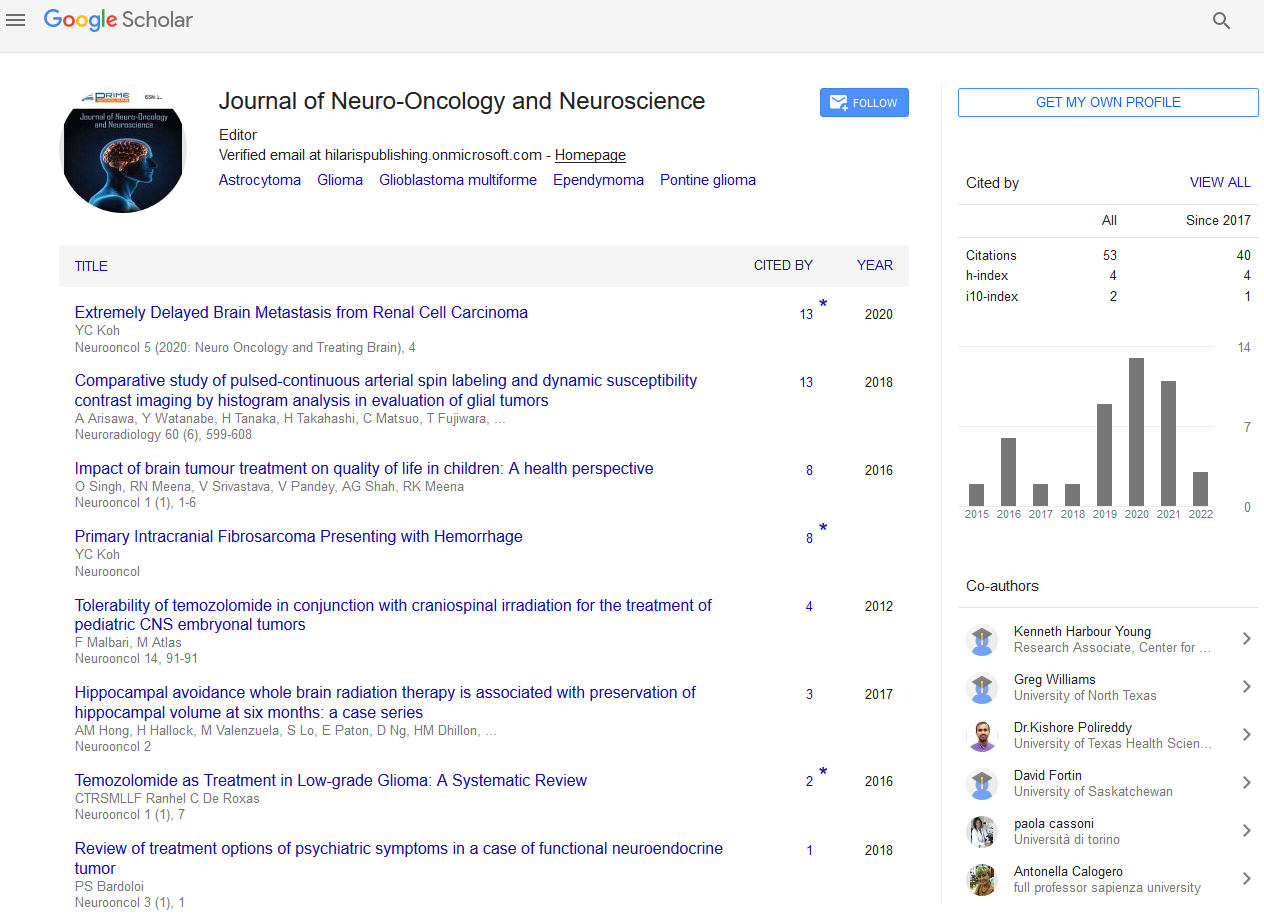Perspective Article - (2023) Volume 8, Issue 4
Navigating the Neurological Complications of Brain Tumor Treatment
Laura Campbell*
Department of Neurology and Neuroscience, University of Freiburg, Germany
*Correspondence:
Laura Campbell,
Department of Neurology and Neuroscience, University of Freiburg,
Germany,
Email:
Received: 29-Nov-2023, Manuscript No. IPJNO-24-19623;
Editor assigned: 01-Dec-2023, Pre QC No. IPJNO-24-19623 (PQ);
Reviewed: 15-Dec-2023, QC No. IPJNO-24-19623;
Revised: 20-Dec-0023, Manuscript No. IPJNO-24-19623 (R);
Published:
27-Dec-2023, DOI: 10.21767/2572-0376.8.4.38
Introduction
Brain tumor treatment represents a multifaceted challenge,
with clinicians aiming to balance the goals of tumor control
and symptom management while minimizing treatmentrelated
neurological complications. While advances in
surgical techniques, radiation therapy, and chemotherapy
have improved outcomes for patients with brain tumors,
these treatments can also lead to a range of neurological
complications that affect patients’ quality of life and overall
prognosis. Understanding and managing these complications
is essential for optimizing patient care and ensuring the best
possible outcomes. One of the most common neurological
complications of brain tumor treatment is neurocognitive
impairment, which encompasses a range of deficits in cognitive
function, including memory, attention, language, and executive
function. Surgery, radiation therapy, and chemotherapy can
all contribute to neurocognitive decline through various
mechanisms, including direct injury to neural tissue, disruption
of neurogenesis and synaptic plasticity, and neuroinflammation.
Neurocognitive impairment can significantly impact patients’
ability to perform daily activities, work, and engage in social
interactions, leading to decreased quality of life and functional
independence.
Description
In addition to neurocognitive impairment, patients undergoing
brain tumor treatment may experience a range of motor
deficits, including weakness, coordination problems, and gait
disturbances. These motor deficits can result from direct injury
to motor pathways during surgery, radiation-induced damage
to the cerebellum or basal ganglia, or chemotherapy-induced
peripheral neuropathy. Motor deficits can impair patients’
mobility, balance, and coordination, increasing the risk of falls
and injuries and affecting their ability to perform activities of
daily living. Treatment-related complications can affect patients’
mental health and emotional well-being, leading to symptoms
of anxiety, depression, and emotional distress. Coping with
a diagnosis of brain tumor and undergoing treatment can
be emotionally challenging, and patients may experience
heightened levels of psychological distress, especially in
the face of treatment-related neurological complications.
Addressing the psychological and emotional needs of patients
with brain tumors is essential for promoting resilience, coping,
and adjustment to the challenges of treatment.
Despite these challenges, there are strategies for managing
and mitigating treatment-related neurological complications
in patients with brain tumors. Multidisciplinary care
teams, including neurologists, neurosurgeons, oncologists,
rehabilitation specialists, and mental health professionals,
collaborate to monitor patients’ neurological status, manage
symptoms, and provide supportive care throughout the
treatment continuum. Rehabilitation interventions, including
physical therapy, occupational therapy, and speech therapy,
and cognitive rehabilitation, can help optimize functional
outcomes and improve quality of life for patients with brain
tumors. Furthermore, advancements in supportive care
and symptom management have led to the development
of targeted therapies for specific treatment-related
complications, such as antiepileptic medications for seizures,
analgesic agents for headaches, and neuroprotective agents
for cognitive impairment. Additionally, psychosocial support
services, including counseling, support groups, and palliative
care, can help address the emotional and psychological needs
of patients and their families, promoting resilience and coping
in the face of treatment-related challenges.
Conclusion
Neurological complications are common in patients undergoing
treatment for brain tumors and can significantly impact
patients’ quality of life and overall prognosis. Understanding
the mechanisms, risk factors, and management strategies for these complications is essential for optimizing patient care
and ensuring the best possible outcomes. By implementing
multidisciplinary approaches to symptom management,
rehabilitation, and supportive care, clinicians can mitigate
treatment-related neurological complications and improve the
overall well-being of patients with brain tumors.
Citation: Campbell L (2023) Navigating the Neurological Complications of Brain Tumor Treatment. Neurooncol. 8:038.
Copyright: ©2023 Campbell L. This is an open-access article distributed under the terms of the Creative Commons Attribution License, which permits unrestricted use, distribution, and reproduction in any medium, provided the original author and source are credited.

